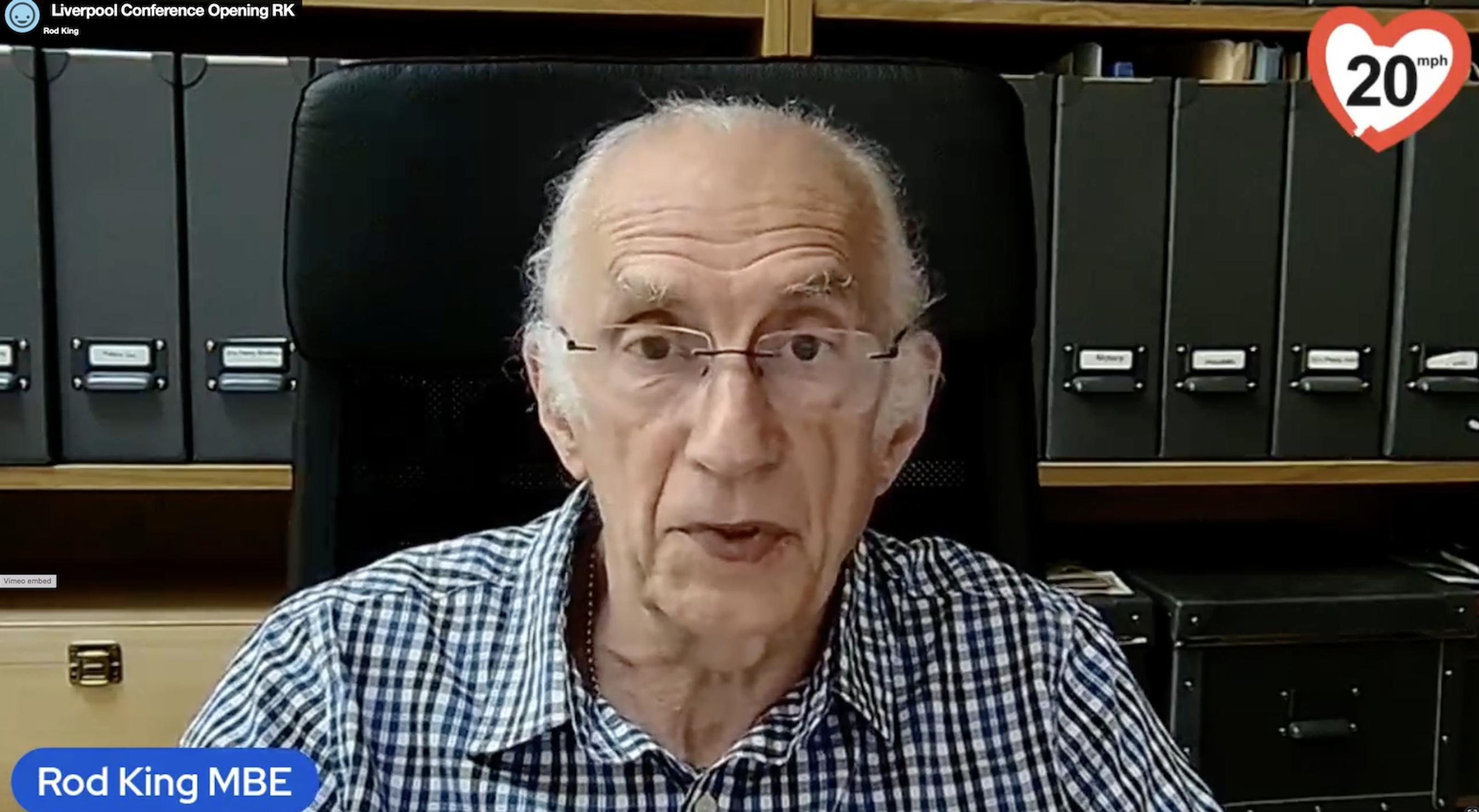
Rod King MBE delivered the opening address at the inaugural National Vision Zero - 20's Plenty conference in Liverpool on 15 May. The conference was hosted by Liverpool City Region and Landor. It had over 200 attendees and was showing how default 20mph urban/village speed limits both complement and form the foundation for Vision Zero and a safe system
Someone once said to me, “you will never meet the person whose life was so profoundly changed by not being the casualty that would have resulted had a 20mph limit not been implemented”. And the same could apply to your actions after today.
Having entered my third decade of campaigning for safer streets through 20mph speed limits, I can reflect on the progress made since 2004 when I started. In that time 20’s Plenty have assisted over 700 local community campaigns to make the case for 20mph as a norm for their city, town or village.
Wales has set a national 20mph default limit for built-up roads achieving a 28% reduction in casualties in the first year and a 20% reduction in “insurance claims”. This has led to a lowering of premiums by £45 a year.
After 20mph successes in Edinburgh and Scottish Borders, Scotland is now rolling out 20mph as a norm via its local authorities. The Isle of Man is setting 20mph for towns and villages and Ireland is implementing a national 30km/h default limit. 20mph is the default in all the Inner London and many Outer London boroughs.
In England, 61 out of 131 local highway authorities have implemented, or are implementing 20mph for most of their urban/village roads. The 30mph limit can no longer be considered as either “national” or “fit for purpose”. 20mph is on a track to become the de-facto national limit throughout Great Britain and Ireland.
The foundation of our success has been that we have always supported communities wanting “to make their places better places to be”.
Even when authorities were disinterested or opposed, we empowered those communities to present the case with constructive evidence, materials, support, advice and enthusiasm with an absolute focus on wide-area 20mph adoption.
And as 20mph implementations increased then it provided even greater evidence of the success of setting 20mph limits, especially on faster main roads with greater speeds and more interactions with people.
Communities are ahead of authorities and police on understanding how speed impacts community life and how reducing speeds enhances those places into safer places to live their lives.
It’s why a 20mph limit as an urban/village norm has so much potential to provide the foundation for Vision Zero.
The lessons learned from 20’s Plenty campaigning offer a useful insight into the challenges faced by the Vision Zero – 20’s Plenty conference – the journey to eliminate death and serious injury on all our roads. And I use those words carefully.
Vision Zero is not simply “an aspiration to reduce death and serious injury” but is “a commitment to act to eliminate death and serious injury on our roads”. This will not be for the faint-hearted. It will be a journey that challenges some of society’s prejudices and bias.
This requires systemic changes in our attitudes, our environment and the way in which we move about our places. It will need to address key and deep issues of speed, driving, infrastructure, legislation, and duty of care. Delivering one element of the Safe System approach is not enough. It must fix safe road use, safe vehicles, safe speeds, safe roads and roadsides, and post-crash responsiveness.
And because of the breadth and depth of action required, this will require a culture change within society, our town and county halls, our police headquarters and our national government and institutions. You being here today is an indication of that change in progress.
Your actions on Vision Zero will open up a whole set of freedoms for those for whom mobility means moving their limbs as well as their bodies. Mobility choices would no longer be conditioned and limited by the fear of motors, but widened by the increased duty of care by drivers and society as a whole. This will bring huge economic benefits. We only have to look a few hundred miles to our East across the North Sea to find communities that are fitter, healthier and with children enjoying levels of independent active mobility that are no longer seen in the UK.
Perhaps I can reflect from an “activists” perspective what I see as some of the key aspects of Vision Zero:
It therefore has to be the necessary requirement and foundation of any Vision Zero strategy to eliminate death and serious injury.
Thank you for your time, involvement and your future actions after attending this hugely important conference which will save lives and life on our roads.
Rod King MBE is the founder and campaign director of 20's Plenty

TransportXtra is part of Landor LINKS
© 2026 TransportXtra | Landor LINKS Ltd | All Rights Reserved
Subscriptions, Magazines & Online Access Enquires
[Frequently Asked Questions]
Email: subs.ltt@landor.co.uk | Tel: +44 (0) 20 7091 7959
Shop & Accounts Enquires
Email: accounts@landor.co.uk | Tel: +44 (0) 20 7091 7855
Advertising Sales & Recruitment Enquires
Email: daniel@landor.co.uk | Tel: +44 (0) 20 7091 7861
Events & Conference Enquires
Email: conferences@landor.co.uk | Tel: +44 (0) 20 7091 7865
Press Releases & Editorial Enquires
Email: info@transportxtra.com | Tel: +44 (0) 20 7091 7875
Privacy Policy | Terms and Conditions | Advertise
Web design london by Brainiac Media 2020